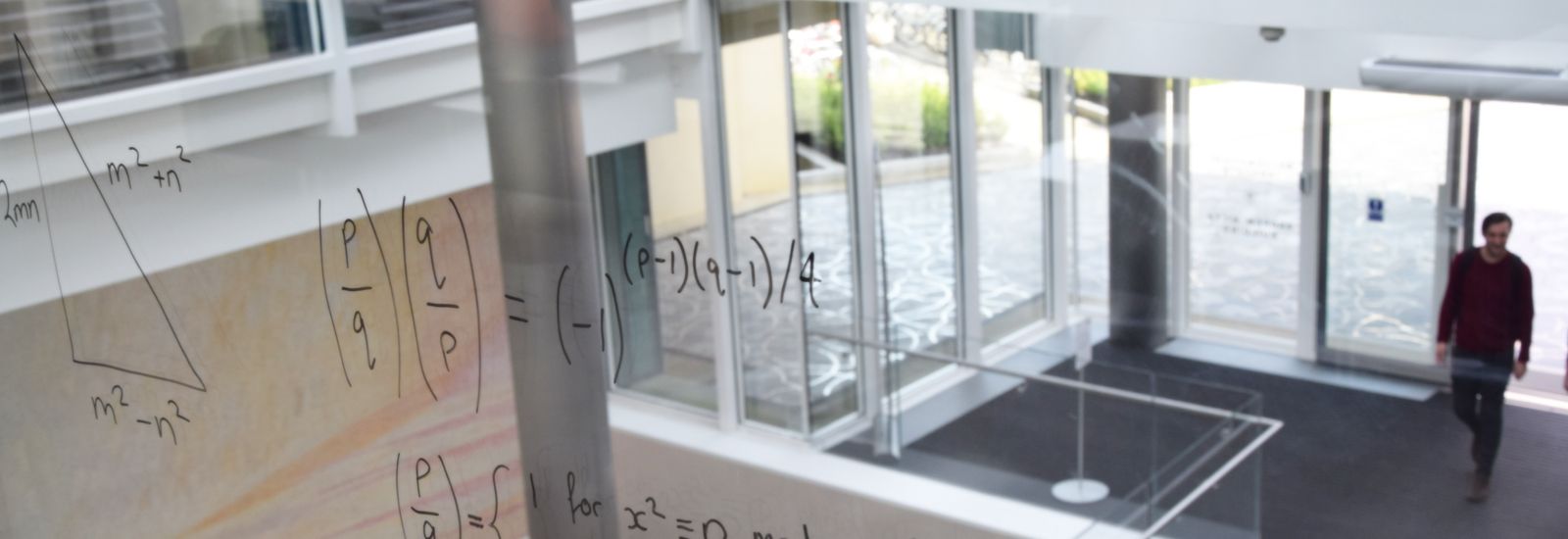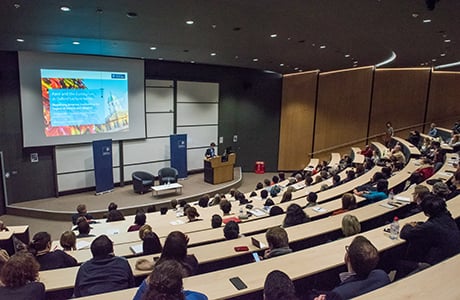
Mathematics and Computer Science
Course overview
UCAS code: GG14
Entrance requirements: A*AA (with A*A in Maths and Further Maths (FM) or A* in Maths if FM is not taken).
Course duration: 3 years (BA); 4 years (MMathCompSci)
Subject requirements
Required subjects: Maths
Recommended subjects: Further Maths
Helpful subjects: Not applicable
Other course requirements
Admissions tests: MAT
Written Work: None
Admissions statistics*
Interviewed: 26%
Successful: 8%
Intake: 51
Successful for a different course: 1%
Applicant intake for a different course: 4
*3-year average 2022-24
Maths contact
Email: [email protected]
Computer Science contact
Tel: +44 (0) 1865 283507
Email: [email protected]
Unistats information for this course can be found at the bottom of the page
Please note that there may be no data available if the number of course participants is very small.
About the course
This joint degree offers the opportunity to combine an appreciation of mathematical reasoning with an understanding of computing.
Mathematics is a fundamental intellectual tool in computing, but computing is increasingly used as a key component in mathematical problem-solving.
The course concentrates on areas where mathematics and computing are most relevant to each other, emphasising the bridges between theory and practice.
It offers opportunities for students to develop a deeper understanding of the mathematical foundations of their subject. The course helps students to acquire a familiarity with the mathematics of application areas where computers can solve otherwise intractable problems. It also gives mathematicians access to both a practical understanding of the use of computers and a deeper understanding of the limits on the use of computers in their own subject.
 | 'For me the best bit of the course is the practical element, such as imperative programming. I like to see new techniques for algorithms and structures because I find it exciting to see how they could be used in the real world. I find the tutorial system very helpful – I think it is the best thing about Oxford. The people here are very competent and the facilities are well suited to the course.' Jessica |
Unistats information
Discover Uni course data provides applicants with Unistats statistics about undergraduate life at Oxford for a particular undergraduate course.
Please select 'see course data' to view the full Unistats data for Mathematics and Computer Science.
Please note that there may be no data available if the number of course participants is very small.
Visit the Studying at Oxford section of this page for a more general insight into what studying here is likely to be like.
Mathematics and Computer Science
A typical week
The typical weekly timetable for a student in Mathematics and Computer Science is similar to that for Computer Science or Mathematics.
Tutorials are usually 2-4 students with a tutor. Class sizes may vary depending on the options you choose. There would usually be around 8-15 students though classes for some of the more popular papers may be larger. Lectures may be up to 120 students.
As the course progresses there will be opportunity to undertake project work. There will be a group project in year two and, for those that choose to continue to year four, a large individual project or dissertation.
Throughout your time studying you will learn from leading maths and computer science specialists and researchers.
To find out more about how our teaching year is structured, visit our Academic Year page.
Course structure
Mathematics and Computer Science can be studied for three years, leading to the award of a BA degree, or for four years, leading to the award of Master of Mathematics and Computer Science (MMathCompSci).
Students do not need to choose between the three-year and four-year options when applying. All students apply for the four-year course, and then decide by the end of their third year whether they wish to continue to the fourth year. In order to proceed into the fourth year (part C), students will need to achieve a 2:1 or higher classification at the end of their third year.
Year 1
Courses | Assessment |
|---|---|
| Five exam papers |
Year 2
Courses | Assessment |
|---|---|
| Eight exam papers (four Computer Science and four Mathematics) |
Year 3
Courses | Assessment |
|---|---|
| Up to eight exam papers |
Year 4
Research | Assessment |
|---|---|
| Written or take-home exams plus a dissertation or project report. |
The courses listed above are illustrative and may change. A full list of current options is available on the Computer Science website.
The content and format of this course may change in some circumstances. Read further information about potential course changes.
Academic requirements
Qualification | Requirement |
|---|---|
A-levels: | A*AA (if Further Mathematics is taken, then including A*A between Mathematics and Further Mathematics; otherwise including A* in Mathematics) |
Advanced Highers: | AA/AAB |
International Baccalaureate (IB): | 39 (including core points) with 766 at HL (the 7 must be in Higher Level Mathematics) |
BTEC: | Please visit the Computer Science website for the latest information on our standard offers for students taking BTECs. |
Any other equivalent qualification: | View information on other UK qualifications, and international qualifications. |
Wherever possible, your grades are considered in the context in which they have been achieved.
Read further information on how we use contextual data.
Subject requirements
Essential: | Candidates are expected to have Mathematics to A-level (A or A* grade), Advanced Higher (A grade), Higher Level in the IB (score 7) or another equivalent. Those taking Further Mathematics A-level or AS-level are required to achieve at least Grade A. |
|---|---|
Recommended: | Further Mathematics is highly recommended. |
If a practical component forms part of any of your science A‐levels used to meet your offer, we expect you to pass it.
If English is not your first language you may also need to meet our English language requirements.
Applying
All candidates must follow the application procedure as shown on our Applying to Oxford pages.
The following information gives specific details for students applying for this course.
Admissions test
Test: | MAT |
|---|---|
Test dates: | 22 & 23 October 2025 |
Registration window: | Registration: 18 June – 19 September (6pm BST) Booking: 18 August – 26 September (6pm BST) |
All candidates must take the Mathematics Admissions Test (MAT) as part of their application.
All the information you need to arrange to take your test as well as how best to prepare can be found on your test page.
Written work
You do not need to submit any written work when you apply for this course.
What are tutors looking for?
The most important qualities we are looking for are strong mathematical ability, the ability to think and work independently, the capacity to absorb and use new ideas, and a great deal of enthusiasm. We use this set of criteria and the result of the Mathematics Admissions Test (MAT) to decide whom to invite for interview.
At the interview we will explore how you tackle unfamiliar problems and new ideas. We are more interested in how you approach problem-solving than whether you can get straight to a solution.
We do not require any previous formal qualification in computer science, but we do expect you to demonstrate a real interest in the subject.
Visit the Maths Department or Department of Computer Science websites for more detail on the selection criteria for this course.
Careers
This course gives training in logical thought and expression, and is a good preparation for many careers.
Some Mathematics and Computer Science graduates go on to further study. Other recent graduates have secured positions as software and hardware professionals, in research and in finance and investment analysis, and include a product controller for an international bank, an actuarial consultant and an accountant.
We don't want anyone who has the academic ability to get a place to study here to be held back by their financial circumstances. To meet that aim, Oxford offers one of the most generous financial support packages available for UK students and this may be supplemented by support from your college.
Fees
Please note that for full-time Home undergraduate students, current university policy is to charge fees at the level of the cap set by the government, which for 2026/27 is £9,790. For details of annual increases, please see our guidance on likely increases to fees and charges. In the 2027/28 academic year course fees for Home fee status students will rise to £10,050 (in line with the government fee cap).
For more information please refer to our course fees page. Fees will usually increase annually. For details, please see our guidance on likely increases to fees and charges.
Living costs
Living costs at Oxford might be less than you’d expect, as our world-class resources and college provision can help keep costs down.
Living costs for the academic year starting in 2026 are estimated to be between £1,405 and £2,105 for each month you are in Oxford. Our academic year is made up of three eight-week terms, so you would not usually need to be in Oxford for much more than six months of the year but may wish to budget over a nine-month period to ensure you also have sufficient funds during the holidays to meet essential costs. For further details please visit our living costs webpage.
Financial support
Home | A tuition fee loan is available from the UK government to cover course fees in full for Home (UK, Irish nationals and other eligible students with UK citizens' rights - see below*) students undertaking their first undergraduate degree**, so you don’t need to pay your course fees up front. In 2026 Oxford is offering one of the most generous bursary packages of any UK university to Home students with a family income of around £50,000 or less, with additional opportunities available to UK students from households with incomes of £32,500 or less. The UK government also provides living costs support to Home students from the UK and those with settled status who meet the residence requirements. *For courses starting on or after 1 August 2021, the UK government has confirmed that EU, other EEA, and Swiss Nationals will be eligible for student finance from the UK government if they have UK citizens’ rights (i.e. if they have pre-settled or settled status, or if they are an Irish citizen covered by the Common Travel Area arrangement). The support you can access from the government will depend on your residency status. |
Islands | Islands students are entitled to different support to that of students from the rest of the UK. Please refer the links below for information on the support to you available from your funding agency: |
Overseas | Please refer to the "Other Scholarships" section of our Oxford Bursaries and Scholarships page. |
**If you have studied at undergraduate level before and completed your course, you will be classed as an Equivalent or Lower Qualification student (ELQ) and won’t be eligible to receive government or Oxford funding
Additional Fees and Charges Information for Mathematics and Computer Science
There are no compulsory costs for this course beyond the fees shown above and your living costs.
Contextual information
Unistats course data from Discover Uni provides applicants with statistics about a particular undergraduate course at Oxford. For a more holistic insight into what studying here is likely to be like, please view the information below and explore our website more widely.
The Oxford tutorial
College tutorials are central to teaching at Oxford. Typically, they take place in your college and are led by your academic tutor(s) who teach as well as do their own research. Students will also receive teaching in a variety of other ways, depending on the course. This will include lectures and classes, and may include laboratory work and fieldwork. However, tutorials offer a level of personalised attention from academic experts unavailable at most universities.
During tutorials (normally lasting an hour), college subject tutors will give you and one or two tutorial partners feedback on prepared work and cover a topic in depth. The other student(s) in your tutorials will typically be doing the same course as you and covering the same topic. Such regular and rigorous academic discussion develops and facilitates learning in a way that isn’t possible through lectures alone. Tutorials also allow for close progress monitoring so tutors can quickly provide additional support if necessary.
Read more about tutorials and an Oxford education
College life
Our colleges are at the heart of Oxford’s reputation as one of the best universities in the world.
- At Oxford, everyone is a member of a college as well as their subject department(s) and the University. Students therefore have both the benefits of belonging to a large, renowned institution and to a small and friendly academic community. Each college or hall is made up of academic and support staff, and students. Colleges provide a safe, supportive environment leaving you free to focus on your studies, enjoy time with friends and make the most of the huge variety of opportunities.
- Each college has a unique character, but generally their facilities are similar. Each one, large or small, will have the following essential facilities:
- Porters’ lodge (a staffed entrance and reception)
- Dining hall
- Lending library (often open 24/7 in term time)
- Student accommodation
- Tutors’ teaching rooms
- Chapel and/or music rooms
- Laundry
- Green spaces
- Common room (known as the JCR).
- All first-year students are offered college accommodation either on the main site of their college or in a nearby college annexe. This means that your neighbours will also be ‘freshers’ and new to life at Oxford. This accommodation is guaranteed, so you don’t need to worry about finding somewhere to live after accepting a place here, all of this is organised for you before you arrive.
- All colleges offer at least one further year of accommodation and some offer it for the entire duration of your degree. You may choose to take up the option to live in your college for the whole of your time at Oxford, or you might decide to arrange your own accommodation after your first year – perhaps because you want to live with friends from other colleges.
- While college academic tutors primarily support your academic development, you can also ask their advice on other things. Lots of other college staff including welfare officers help students settle in and are available to offer guidance on practical or health matters. Current students also actively support students in earlier years, sometimes as part of a college ‘family’ or as peer supporters trained by the University’s Counselling Service.
Connect with us
Outreach programmes and events
The Department of Computer Science and the Mathematical Institute run dedicated outreach programmes, events and activities aimed at promoting their subjects and supporting talented students from all backgrounds to apply to the course.
Teachers, school students and parents are invited to join the Department of Computer Science mailing list and the Mathematical Institute outreach mailing list to hear about upcoming opportunities.
Programmes and subject-specific resources
There are a variety of online and in-person outreach events that are delivered by the Mathematical Institute each year. Some examples of events include:
- Oxford Online Maths Club: a weekly livestream with fun maths problems and puzzles mainly aimed at sixth form students looking to study maths at university. (January – June)
- MAT livestream: a weekly online event talking about maths problems and discussing problem-solving strategies with a focus on Oxford's Mathematics Admissions Test. (June – October)
- It All Adds Up: a series of one-day conferences for female and non-binary pupils in Years 9-12 interested in maths, with workshops and talks to inspire students. (January)
- Oxfordshire Maths Masterclasses: these highly interactive sessions for Oxfordshire schools introduce students to aspects or applications of maths which are not usually covered in the school curriculum. (January – March)
- Maths Departmental Open Days: there are two Departmental Open Days for prospective undergraduates each year – one in-person at the Maths Institute in Oxford for a day of Mathematics talks and course information, one online virtual open day with course information and pre-recorded Mathematics talks. (April/May)
UK state school students interested in mathematics and computer science can apply to UNIQ, Oxford’s flagship outreach programme for students in their first year of further education. Each year, UNIQ provides over 1,500 students with the opportunity to experience Oxford teaching and receive application support.
Anyone interested in studying Mathematics and Computer Science at Oxford is encouraged to explore details of subject-specific opportunities and resources on the Department of Computer Science website and the Mathematical Institute website. Please note that some outreach events may require advance booking or have specific eligibility criteria.
Department contact details
![]() +44 (0) 1865 273821
+44 (0) 1865 273821![]() [email protected]
[email protected]![]() www.cs.ox.ac.uk/opendays
www.cs.ox.ac.uk/opendays
![]() +44 (0) 1865 273525
+44 (0) 1865 273525![]() [email protected]
[email protected]![]() www.maths.ox.ac.uk/outreach
www.maths.ox.ac.uk/outreach
University-wide events and resources
In addition to exploring department-run activities, we recommend checking out the outreach event calendar for upcoming University-wide events and other subject and college activities.
Subject-specific resources supporting supercurricular engagement for all ages can also be found via the University's Digital Resource Hub, suggested subject resources webpage and Oxplore, our online learning platform for 11-to-18-year-olds.
Prospective applicants can sign up to receive step-by-step support with their Oxford application.
Read more about Oxford's widening access initiatives and other ways to connect with us before applying.

